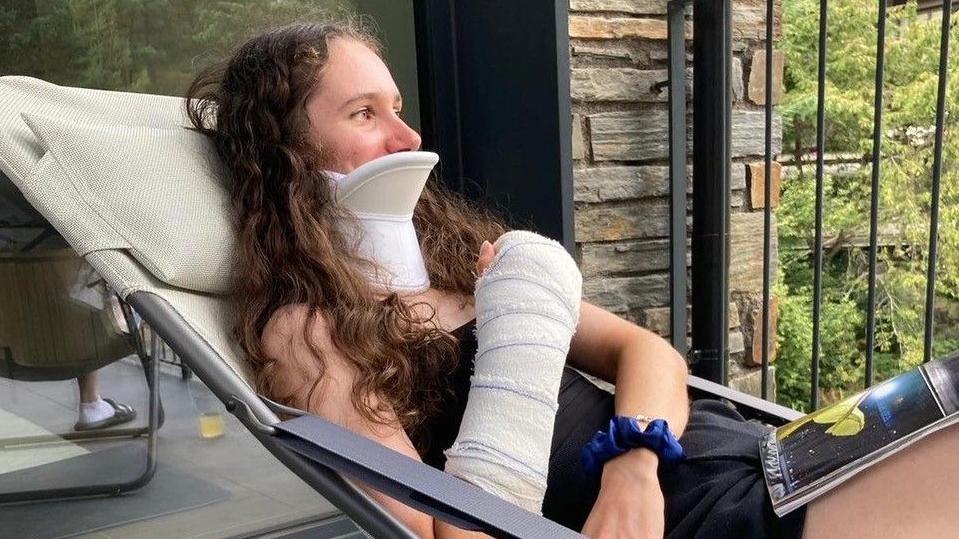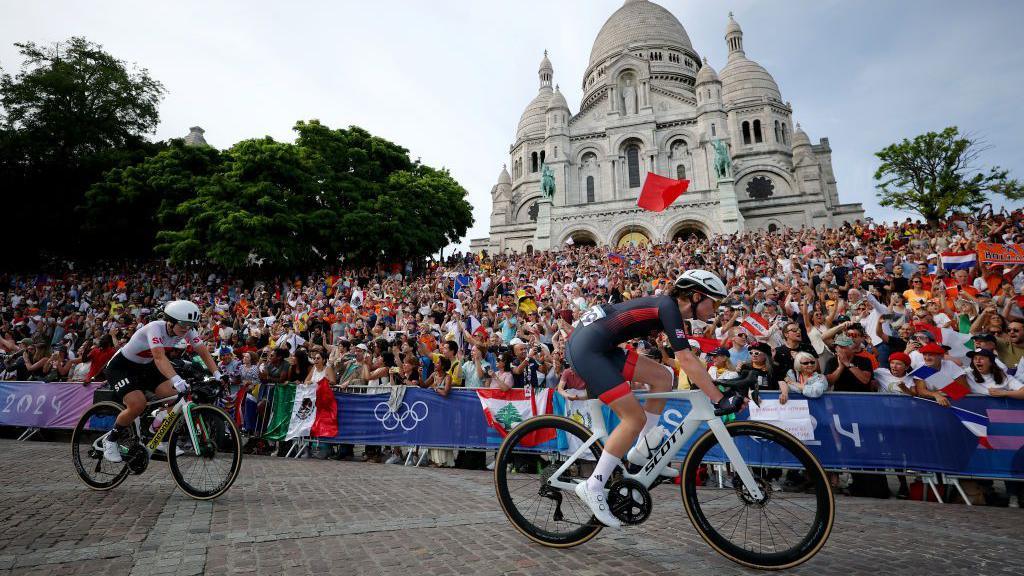
British road champion Pfeiffer Georgi says she has not watched her crash at the Tour de France Femmes, when she fell and fractured her neck.
The 23-year-old went over her handlebars coming out of a roundabout in a mass crash on the fifth stage of the race in August.
Georgi also fractured her hand in the incident and spent 10 weeks in a neck brace as she recovered. She rode her bike outside for the first time since the crash last week.
“I’ve not watched it back because I don’t want to see it,” she told BBC Sport.
“I remember it felt quite unexpected, we all thought we were going straight and then I just saw people crashing in front of me.
“I didn’t even have time to break or bunny hop or anything. I just hit them and flipped over and landed on the top of my head.”
The crash resulted in the second serious injury Georgi has suffered during her career, after she fractured her vertebrae on the other side in November 2020 while racing at Classic Brugge-De Panne and had to learn how to walk again.
The DSM-Firmenich PostNL rider said she felt similar pain when she was lying on the tarmac.
“I kind of knew that feeling and I straight away thought my hand was broken and that was what I was more certain of,” she added.
“Then after like five to 10 minutes, I started getting the same pain as I had before so I thought maybe this [the neck] is broken.”
The crash ended Georgi’s 2024 campaign, what she has called her “best season” so far in her six-year professional career.
She won the national road title for the third time in June, finished fifth at the Olympics road race in Paris and third at monument Paris-Roubaix.
“I tried to re-frame it as like I’d had a really great year. I did the classics and I had Roubaix and Nationals and Olympics and my main goals were done,” she said.
“I was trying not to think ‘oh, it’s annoying that I’m in great shape’. I was thinking, ‘OK, we’ve achieved a lot.'”
Georgi, from Gloucestershire, now lives in Andorra and said her mum came to stay with her for the first few weeks of her recovery, which ended up taking longer than expected.
Her hand was initially in a cast and her neck was in a fixed brace, before she was able to wear a flexible removable one.
“Initially they said one month and then in the end it was three months before I was even allowed on the road,” she said.
“That was also quite hard because every few weeks I thought I’ll be back on the road next week, next week, next week. And then I had to wait 90 days for the fracture to be completely consolidated.”
-
-
23 March 2023
-
While the broken bones have now healed the mental scars take longer.
After the 2020 crash she worked with a psychologist to get her confidence back to ride in a race.
She is seeking the same support again to learn coping and relaxation techniques by visualising herself in a race scenario.
“I remember from last time I was really terrified because I was just scared that it might happen again, or that it could have been worse,” she said.
“Both times the doctors have said have been like you’re very lucky to have full mobility still. I think that’s probably the hardest part of it because the recovery time will be like six weeks or three months or whatever, and then it’s done.
“But it’s the impact of that that I’ve found is the hardest bit.”
‘Two best days of my career’

Results on the road this year marked a significant step forward for Georgi. She finished third in Roubaix in a sprint finish, after chasing back up to the front group on her own.
At the Olympics she was in medal contention on the final lap before she was dropped on the climb of Montmartre with 10km to go and rode solo to claim fifth.
“I think they were probably my two best days of the year and of my career. I think that’s just really exciting – that shows that I’m like getting towards the level that I want to be and competitive in the races that I love,” Georgi said.
“I think that gives me confidence going forward, definitely.
“My legs just exploded [in Paris] and I saw my dream slipping away from me up the Montmartre the last time.
“Initially I was really disappointed after the line, but I gave it everything I had on the day and I think I was performing really well. On reflection, I can’t be disappointed, it still was a good result.
“It’s just when you have a chance once every four years and a medal could have potentially been possible then it was quite hard at the time.”
As a one-day racing specialist primarily, the goal next season is more of the same with Paris-Roubaix, Gent-Wevelgem and the inaugural edition of the women’s Milan-San Remo in the spring to target.
“I’m ready to get back to work because I’ve had enough time sat on the sofa to be honest,” Georgi said.
